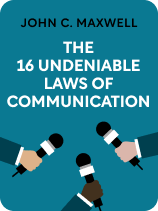

This article is an excerpt from the Shortform book guide to "The 16 Undeniable Laws of Communication" by John C. Maxwell. Shortform has the world's best summaries and analyses of books you should be reading.
Like this article? Sign up for a free trial here.
When you speak, do people tune out? How does your audience know that you care about them?
According to John Maxwell, your primary goal when communicating should be to connect with your audience and to provide them with valuable and meaningful content. He explains why connection matters and how to build it.
Keep reading for Maxwell’s advice on how to connect with your audience when you speak.
How to Connect With Your Audience
Connection is crucial because it breaks down barriers that prevent people from listening to you, which makes them more receptive to you and your ideas. Maxwell’s recommendation for how to connect with your audience is to give them your full focus when speaking. Pay attention to their needs instead of trying to make yourself or your message appear flawless. People won’t care about your words if they don’t believe you care about them.
(Shortform note: Some experts suggest you start connecting with your listeners before your presentation begins. As audience members enter the room, talk with a few of them and learn their names. That way, you can address some members of the audience by name during your presentation to make your message more personalized. This may also make your audience feel cared about and thus more willing to listen to you.)
To show the audience that you care, actively put yourself in their shoes: Consider what they feel, think, and desire, and make them feel valued in ways that are important to them. You can do this by interacting with them, expressing your gratitude, or celebrating their accomplishments. Maxwell suggests you make your audience more receptive to you by removing mental and physical barriers. For instance, be friendly and create a comfortable atmosphere so that your audience feels at ease. Or, instead of standing behind a large podium, try sitting by the edge of the stage.
(Shortform note: You may find it easier to put yourself in your audience’s shoes if you first work on developing your empathy, which Daniel Goleman defines as your ability to understand and relate to the emotions of others. In Emotional Intelligence, Goleman says that your empathy level largely depends on how your parents raised you. However, other experts say you can still improve your empathy in numerous ways, like by reading fiction, exploring diverse media, and challenging your assumptions when you make automatic judgments.)
When you focus on your audience and make them feel good, you make a positive first impression, Maxwell writes. When your audience feels positive about you, they will naturally like you more and be more open to your ideas.
(Shortform note: Maxwell’s advice focuses on how to use your attention to make a good impression, but other experts say that you should also use your body language to appear approachable to your audience. In How to Talk to Anyone, Leil Lowndes argues that nonverbal signals play a big part in how people judge you. Before you start speaking, make sure your body’s sending positive signs: Stand up tall and keep your arms at your side with your palms facing up.)

———End of Preview———
Like what you just read? Read the rest of the world's best book summary and analysis of John C. Maxwell's "The 16 Undeniable Laws of Communication" at Shortform.
Here's what you'll find in our full The 16 Undeniable Laws of Communication summary:
- The secrets to becoming a confident and effective communicator
- How anyone can master public speaking, no matter how nervous they get
- How to write a clear and engaging speech






